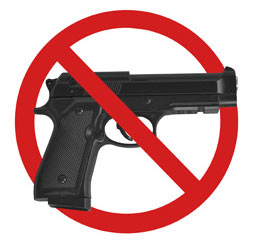

The Lautenberg Amendment is an addition to the Gun Control Act of 1968. The Lautenberg Amendment is a federal gun ban that bans shipment, transportation, ownership, and use of guns or ammunition by individuals convicted of an offense that meets the federal definition of misdemeanor domestic violence, or who is under a restraining (protection) order for domestic abuse.

A misdemeanor domestic violence arrest prohibits firearm ownership
The Lautenberg Amendment, also known as the Domestic Violence Offender Gun Ban, is named for the amendment's sponsor, Senator Frank Lautenberg. The amendment prohibits any persons convicted of an offense involving misdemeanor domestic violence from owning or possessing firearms and ammunition under any circumstances.
The amendment was first presented in United States v. Emerson (2002) when the United States Court of Appeals for the Fifth Circuit challenged the Constitutionality of 18 U.S.C. § 922(g)(8)(C)(ii) by prohibiting those who have used or who have attempted to use physical force against an intimate partner or child from transporting firearms or ammunition in interstate commerce. United States v. Emerson ultimately decided that the Second Amendment does not guarantee anyone the right to keep and bear arms and therefore it is not unconstitutional to deprive certain individuals of the right to bear arms.
The Lautenberg Amendment pertains to anyone with an offense involving misdemeanor domestic violence. Regardless of whether an offender is a member of the police force or the military, the ban on firearms will remain enacted for personal firearm possession. The amendment does not prevent service members from possessing a service firearm while on duty under federal law.

That said, there are many circumstances in which the Lautenberg Amendment may affect members of the armed forces. For instance, any member of the military who is in violation of any of the listed misdemeanors under the Lautenberg Amendment may not be eligible for deployment, and may be dismissed from active duty. Similarly, police officers may also be dismissed from their duties if their domestic violence misdemeanor offense falls under the terms of the Lautenberg Amendment.
No. The Lautenberg Amendment places a federal lifetime ban on firearm arms. Restoration of firearms for individuals whose domestic violence misdemeanor falls under this amendment is treated case by case and is only granted in very narrow circumstances.
The federal definition of misdemeanor domestic violence has “an element of the use or attempted use of physical force, or the threatened use of a deadly weapon, committed by a current or former spouse, parent, or guardian of the victim, by a person with whom the victim shares a child in common, by a person who is cohabiting with or has cohabited with the victim as a spouse, parent, or guardian, or by a person similarly situated to a spouse, parent, or guardian of the victim."
Anyone whose conviction falls under these terms will be subject to the federal ban on firearms and as such will most likely not be eligible to restore his or her Second Amendment right.
In certain states, such as in Washington and Indiana, it may be possible to restore firearm rights. Again, there is no set rule for restoration of firearm rights and each petition of restoration is treated case by case. There are also certain requirements that need to be met in regards to the nature of the case and offense for the given state in which the case occurred.
As per U.S. U.S.C. § 921(a)(33)(ii), "A person shall not be considered to have been convicted of such an offense for purposes of this chapter if the conviction has been expunged or set aside, or is an offense for which the person has been pardoned or has had civil rights restored (if the law of the applicable jurisdiction provides for the loss of civil rights under such an offense) unless the pardon, expungement, or restoration of civil rights expressly provides that the person may not ship, transport, possess, or receive firearms."
In other words, if your state does not have laws explaining that you have lost your firearm rights due to your misdemeanor domestic violence conviction, then the federal government cannot recognize the lose of your rights, and therefore cannot restore those rights to you.
Take our free firearm restoration eligibility test or call RecordGone.com toll free at (877) 573-7273 for your free over-the-phone consultation to see if you are eligible to restore your firearm rights today.
The Law Firm of Higbee & Associates’ criminal record division, RecordGone.com, assists in providing information and services for those who have a criminal record and are interested in restoring their firearm rights.